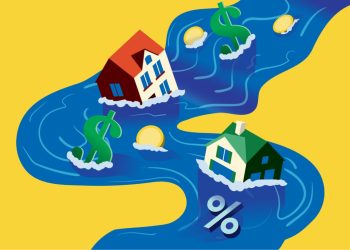A new study by economists at the University of California, Berkeley, and Oregon State University suggests that the U.S. housing crisis that started in 2007 and eventually led to a worldwide financial crisis was triggered by rapidly rising gas prices.
Economic bubbles have a long history – from the Dutch tulip mania in the 1600s to this latest housing bubble – and many factors can cause them to inflate, the researchers say.
But little is known about what actually triggers a bubble to burst.
“The key word is, ‘triggered,'” said JunJie Wu, an OSU economist and one of the authors of the paper. “This theory recognizes the role of subprime mortgages and lax lending practices as inflating the housing bubble, but high gasoline prices provided the trigger that burst the bubble.”
According to Wu and his fellow authors, Steven Sexton and David Zilberman, both economists from U.C. Berkeley, there is general agreement that the collapse of the housing market initiated the 2007 financial crisis. But there is no consensus on what prompted the housing market collapse.
In their study, the authors show how low gas prices during the housing boom, in combination with easy access to credit and new mortgage products, made suburban houses affordable to a new class of homeowners characterized by low incomes, high leverage, low credit worthiness and long work commutes.
“As a result,” Wu said, “housing markets were vulnerable.”
When oil prices more than doubled between late 2006 and 2008, sending gas prices to $4.15 per gallon, the calculus of suburban living changed, according to the researchers. High commute costs made suburban homes less valuable and mortgages less affordable for low-income homeowners. Some households could no longer meet mortgage obligations and others walked away from mortgage debt that exceeded the deflated market values of their homes.
“The real-estate mantra is ‘location, location, location,'” Wu said. “If you find yourself in a location that is far from your work and transportation costs rise suddenly, that location can lower the value of your house.”
The housing boom that began in the late 1990s, and the half-century of suburbanization that preceded it, produced a housing stock that by 2006 was particularly vulnerable to gas price shocks, according to the authors. Cheap and easy credit made owning a home possible for more households of limited means than at any other time in U.S. history.
Many suburban homes were located away from business centers and they tended to be in excess supply. Exurban areas grew twice as fast as metropolitan areas and as a consequence, commute durations grew. From 1970 to 2006, average vehicle miles traveled climbed 177 percent.
The researchers contend that a doubling of gas prices relative to historic averages made mortgage payments unaffordable for some, particularly for low-income households, and that mortgage default rates were higher in commuter towns.
The researchers considered only the impact of rising U.S. gasoline prices in this analysis, and they are quick to recognize many complex influences on the price of gas, including the global rise of the middle class and political unrest in oil-producing nations.
Does their research have implications for the current rise in gas prices?
“I expect that high gas prices will slow the economic recovery in general and the recovery of housing markets in particular,” Wu said, “especially for communities tied to high transportation costs.”
The paper, “How High Gas Prices Triggered the Housing Crisis: Theory and Empirical Evidence,” was published in February 2012 by the University of California Center for Energy and Environmental Economics.
What do you think? Like us on Facebook and let us know your thoughts!










